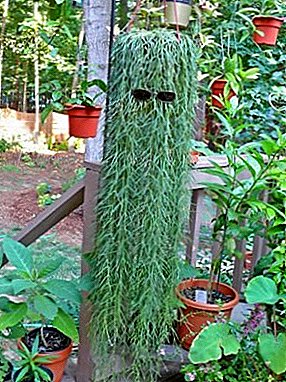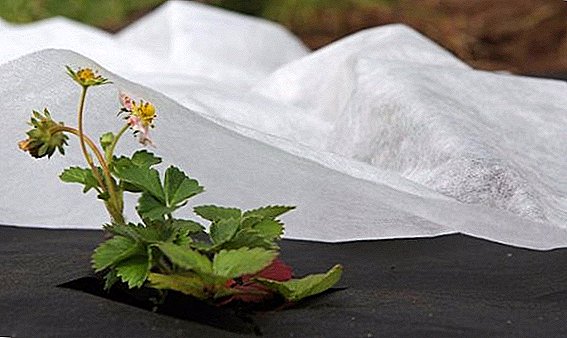 Thanks to the hard work of breeders, reparative varieties of strawberries have improved characteristics, are more resistant to climatic conditions and, most importantly, produce several harvests per season.
Thanks to the hard work of breeders, reparative varieties of strawberries have improved characteristics, are more resistant to climatic conditions and, most importantly, produce several harvests per season.
About one of these varieties - strawberry "Fresco" tell this article.
Strawberry "Fresco": description and characteristics
This variety has strong bushes up to 30 cm tall, the bushes give a lot of inflorescences and fruitfully bear fruit. The variety has increased resistance to weather changes and immunity against many diseases of the crop. Strawberry "Fresco" in the description of the variety is represented by a very productive crop: in the first year of fruiting, up to one and a half kilograms of berries are gathered from a square meter. The berries are saturated red in color up to 20 grams in weight, have a dense, juicy flesh of sweet-sour taste. The aroma of the fruit is strong and pleasant. The plant begins to bear fruit five months after planting, the fruits are harvested several times from June to October.
Did you know? In New Orleans, in the restaurant "Arnaud's" for lovers of the exotic serves a special strawberry dish - this is the usual strawberry with cream and mint, the highlight is the pink diamond ring (five carats), which is presented with the dish. The cost of the dessert is simply transcendental - more than a million dollars.
Landing conditions
This variety multiplies seeds, sowing seedlings can be carried out at home, while respecting several rules.
Soil for sowing
To prepare a high-quality substrate for seedlings, it is necessary to take sand and crumbly humus in a ratio of 3: 5. The soil mixture needs to be disinfected: put it in the oven for three to four hours at a temperature of about a hundred degrees. 
Lighting and temperature
In order for all seeds to germinate successfully, they need to create the right conditions: bright light for at least 12 hours a day, room temperature up to 22 degrees Celsius. For long-term illumination, fluorescent lamps will be required. Seedlings will need to be periodically ventilated, removing the film from it.
Check out other varieties of strawberries, such as "Elizabeth 2", "Masha", "Lord", "Festival", "Queen Elizabeth", "Gigantella", "Albion", "Kimberly", "Malvina", "Asia" , "Marshal".
Landing technology
Before sowing, the seeds undergo a stratification procedure: the seeds spread out on a piece of damp cloth and the seeds placed in a plastic container are kept warm for several days, then in a refrigerator for two weeks. This process will help the seeds "to turn."
Important! The container with planting material during stratification does not need to be closed with a tight lid so that the seeds do not suffocate.
Seed dates
Seeds are sown in mid-February, grown seedlings are transplanted into the open ground in early June. 
Landing pattern
Planting material is spread over the surface of the prepared wet soil, the ground is not covered. The container with crops cover with a film and put in a warm place. It is important to sow on a wet soil, and not to water later, so as not to wash off the seeds. Saplings are planted in staggered order at a distance of 25-30 cm from each other.
Care of seedlings and the subsequent disembarkation in an open ground
Caring for seedlings is to moisten the soil by spraying and maintaining the temperature regime, and sowing also needs lighting.
Important! The best predecessors for strawberries are flower plants (crocuses, tulips, hyacinths), parsley, garlic, beans. It is not recommended to plant strawberries after cucumbers, cabbage, potatoes and tomatoes.When two strong leaves appear, the strongest seedlings are selected and dive into separate pots, while the temperature is reduced to 14 degrees.
The seedling is ready to be transplanted to the plot when five leaves appear on the plant. A week before transplantation, seedlings are gradually hardened.
For planting, the area is carefully cleaned of weeds and fertilized: 30 g of ammonium nitrate and potassium salt and 70 g of superphosphate are added to ten liters of humus. Landing technology:
- the soil in the beds carefully loosen rake;
- make holes 30x30 and pour them with water;
- bushes planted vertically, straightening the root system;
- root neck remains above the ground line;
- planted bushes water and mulch.

Secrets of care
After the first portion of the harvest, the remanufacturing strawberries are cut - the leaves are cut, and only a plate of leaves is cut, so as not to damage the growing point.
Did you know? In the acting environment of Hollywood, the strawberry diet is popular. It is not surprising: the calorie berries - 41 kcal per hundred grams of product. Strawberries also have very little natural sugar, although the taste of the berry is sweet, no matter how strange it may sound, but even in lemon it is more sugar.
Watering features
Watering strawberries requires regular and moderate, it is best to apply the drip irrigation method, which allows to evenly distribute moisture over the surface and into the ground. Water is used while warm, the frequency of irrigation depends on the speed of drying of the soil surface.
Soil care
During the growing season, the soil in the garden must be loosened by breaking the crust and giving air access to the root system.
Weeding is regularly carried out, cleaning from weeds.  Mulch on beds protects the soil from evaporation of moisture and roots from overheating, in the presence of mulch the need for frequent weeding and loosening will disappear.
Mulch on beds protects the soil from evaporation of moisture and roots from overheating, in the presence of mulch the need for frequent weeding and loosening will disappear.
Top dressing "Frescos"
During the growing season, plantings are fed with nitrogen and potassium; for this purpose, herbal infusions, slurry or a mash from a compost are prepared. Particularly relevant liquid fertilizer with drip irrigation system. Feed the plant before flowering and before fruiting.
Important! During the fruiting period, watering is reduced so that the berries are not too watery and sour.
Protection against diseases and pests
To protect the plants from diseases, spray Bordeaux liquid before flowering. As a prophylaxis also use karbofos: 60 g of substance per 10 liters of water.
Strawberry "Fresco" - remontant variety that has resistance to disease, it is more threatened by insects. To fight mainly used with them folk ways:
- infusion of garlic cloves;
- decoction of wormwood;
- infusion of tops of tomatoes.
Features winter garden strawberries
The strawberry variety "Fresco" is frost resistant, but it is still worth preparing for winter. To get a good harvest the next year, beds with strawberries should be fed for the winter after harvest with preparations with a complex composition.  Scissors or shears from the bushes pruned leaves, mustaches and time to form new sockets. All this is removed before the winter, there are only stems, old bushes. This is done so that food and strength in the winter are not wasted. After pruning, the bushes are mulched with a thick layer of peat.
Scissors or shears from the bushes pruned leaves, mustaches and time to form new sockets. All this is removed before the winter, there are only stems, old bushes. This is done so that food and strength in the winter are not wasted. After pruning, the bushes are mulched with a thick layer of peat.
In winter, the best covering material for plants is snow. The more of it, the warmer. Many experienced gardeners leave branches cut from trees: they do not allow the snow to come off and help form snowdrifts.
Harvesting
When growing remontant varieties of strawberries, one should know that the first harvest of berries is usually not the largest, it disappoints many. However, the subsequent August collection will delight you with quality and quantity.  The strawberry variety "Fresco" bears fruit for about five months: from June to October. Ripe red berries are harvested by hand. Try not to over ripen - the berries will crumple in your hand. In order not to damage the berries, it is better to remove them with a stalk with scissors.
The strawberry variety "Fresco" bears fruit for about five months: from June to October. Ripe red berries are harvested by hand. Try not to over ripen - the berries will crumple in your hand. In order not to damage the berries, it is better to remove them with a stalk with scissors.
Since the ripening period, the harvest is carried out almost every day, the process takes place in the morning or evening hours in dry weather. Then the berries are sorted and sorted. If the fruits are prepared for transportation, then when assembling, they are immediately placed in boxes lined with parchment.
The list of drugs that will undoubtedly be useful to you in the care of the garden and garden: "Kvadris", "Strobe", "Buton", "Corado", "Hom", "Confidor", "Zircon", "Topaz", "Amprolium", "Titus".
Advantages and disadvantages of the variety
The main advantages of the variety are:
- frost resistance;
- resistance to heat;
- disease resistance;
- high yield;
- prolonged fruiting;
- good transportability;
- excellent taste characteristics.
 Summarizing the above, I would like to add another indisputable advantage of the "Fresco" variety - this strawberry is universal in use, it is consumed fresh, salads, desserts, sauces are prepared and prepared for the winter.
Summarizing the above, I would like to add another indisputable advantage of the "Fresco" variety - this strawberry is universal in use, it is consumed fresh, salads, desserts, sauces are prepared and prepared for the winter.











